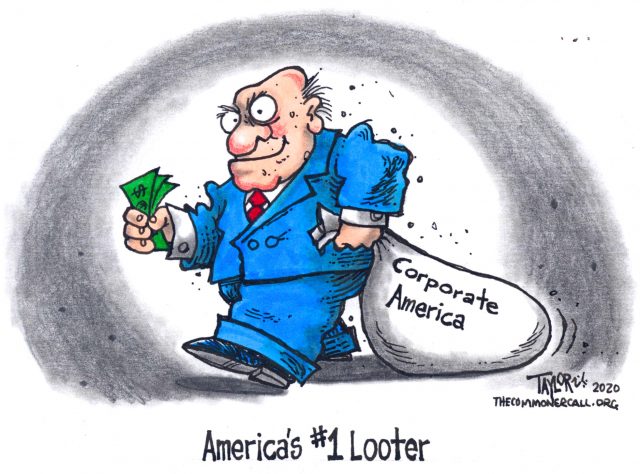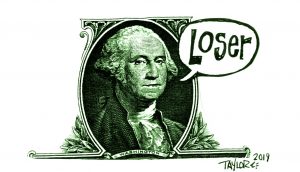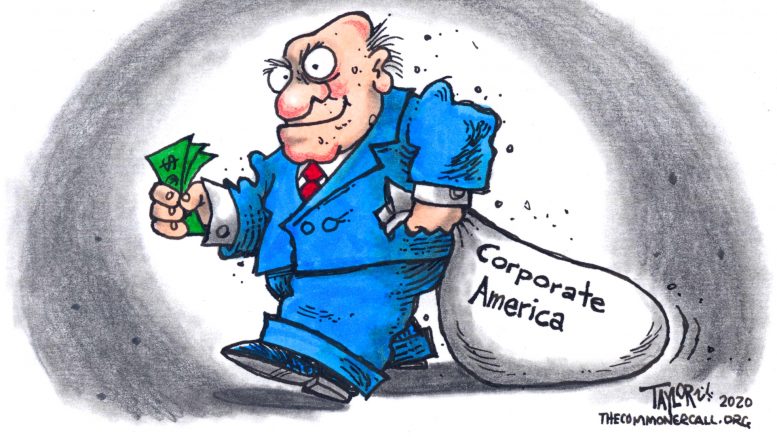
Corporate capitalism has proven itself to be fully capable of methodical sadism in the pursuit of maximizing profits.
[Editor’s Note: It is not a matter of GOP vs Dem or Left vs Right or even Trump vs Biden — it is all about TOP vs BOTTOM.– Mark L. Taylor]
By Norman Soloman
Reader Supported News (6/10/20)
Grassroots outrage and nationwide protests after Minneapolis cops murdered George Floyd have pushed much of U.S. corporate media into focusing on deadly police mistreatment of black people. The coverage is far from comprehensive on the subject of racism in the “criminal justice” system – we’re still hearing very little about the routine violations of basic rights in courtrooms and behind bars – yet there’s no doubt that a breakthrough has occurred. The last two weeks have opened up a lot more media space for illuminating racial cruelty.
But what about economic cruelty?
Media outlets routinely detour around reasons why African Americans and other people of color are so disproportionately poor – and, as a result of poverty, are dying much younger than white people. The media ruts bypass confronting how the wealthy gain more wealth and large corporations reap more profits at the expense of poor and middle-income people.
The statistics are grim. For every black person killed by police, vastly more are dying because of such conditions as a threadbare safety net, a lack of adequate employment, and scant access to health care or social services.
Readily available numbers are indictments of systemic racism. At the same time, numbers tell us virtually nothing about the human essence of widespread, tragic and fully preventable suffering that, in the words of Marvin Gaye’s brilliant song “Inner City Blues,” make me wanna holler.
“When we say #DefundPolice, what we mean is people are dying and we need to invest in people’s livelihoods instead. Example: Detroit spent $294 million on police last year, and $9 million on health. This is systemic oppression in numbers.” — Rep. Rashida Tlaib tweet
News media habitually tiptoe around deadly realities of economic oppression that are hidden in plain sight – so normalized that they’re apt to seem perversely natural. Meanwhile, government is routinely portrayed as inherently hamstrung, lacking in funds and unable to cope. But from city halls and state legislatures to corridors of power in Washington, the priorities that hold sway are largely imposed by leverage from big corporations and the wealthy who want their financial interests protected.
“When we say #DefundPolice,” Congresswoman Rashida Tlaib tweeted days ago, “what we mean is people are dying and we need to invest in people’s livelihoods instead. Example: Detroit spent $294 million on police last year, and $9 million on health. This is systemic oppression in numbers.”
The official city bar chart that accompanied Tlaib’s tweet amounts to a smoking gun of a ceaseless class war raging across the United States and far beyond. Huge numbers of people whose names we’ll never know are casualties of that profit-driven war.
Vicious economic exploitation
From slavery onwards, vicious economic exploitation has been central to the oppression of African Americans. In spite of that reality – and because of it – the prevailing power structure and its dominant media arms are eager to separate racial justice from economic justice.
Yet the separation is absurd and disingenuous. “A close examination of wealth in the U.S. finds evidence of staggering racial disparities,” the Brookings Institution reported this year. The latest figures show that “the net worth of a typical white family is nearly 10 times greater than that of a black family.” Those wealth gaps “reveal the effects of accumulated inequality and discrimination, as well as differences in power and opportunity that can be traced back to this nation’s inception.”
It’s symbolic that while we’ve often heard that Martin Luther King Jr. gave his famous “I have a dream” speech at the historic march on Washington in 1963, the fact that it was called the “March on Washington for Jobs and Freedom” isn’t often mentioned. Five years later, King was murdered while in Memphis to support a union struggle by exploited sanitation workers as he was immersed in planning the next stages of the Poor People’s Campaign.
Ignored lethal consequences
Today, the humongous gaps between wealth and poverty – and the lethal consequences of those gaps – are rarely in mass-media focus. Empathy for low-income people might be fine in medialand, but they’re commonly portrayed as victims of bad luck or personal failings rather than the prey of victimizers who profit from immiseration.
As a practical matter, the economic ladder that keeps some people trapped on the lowest rungs is central to the health vulnerabilities of so many African Americans. Economic injustice is vital to the entire U.S. power structure. While many people of all races suffer as a result, people of color are at much greater risk.
In effect, corporate capitalism has proven itself to be fully capable of methodical sadism in the pursuit of maximizing profits. That ongoing reality, 24/7/365, is so routine – and so powerfully entrenched – that even U.S. news outlets doing decent coverage of police violence can rarely supply clarity about the “free enterprise” economic violence that is taking countless lives.
*****
While Trump Stokes Division With Racism & Rage – The Rapacious American Oligarchy Purrs

They know that as long as racial animosity exists, white and black Americans are less likely to look upward and see where the wealth and power really has gone.
By Robert Reich
The Guardian (6/14/20)
Jamie Dimon, chief executive of JPMorgan Chase, took the knee last week before cameras at a branch of his bank. Larry Fink, CEO of giant investment fund BlackRock, decried racial bias. Starbucks vowed to “stand in solidarity with our black partners, customers and communities”. Goldman Sachs chairman and CEO David Solomon said he grieved “for the lives of George Floyd, Ahmaud Arbery, Breonna Taylor and countless other victims of racism.”
And so on across the highest reaches of corporate America, an outpouring of solidarity with those protesting brutal police killings of black Americans and systemic racism.
But most of this is for show.
JPMorgan has made it difficult for black people to get mortgage loans. In 2017, the bank paid $55m to settle a justice department lawsuit accusing it of discriminating against minority borrowers. Researchers have found banks routinely charge black mortgage borrowers higher interest rates than white borrowers and deny them mortgages white applicants would have received.
BlackRock is one of the biggest investors in private prisons, disproportionately incarcerating black and Latino men.
Starbucks has prohibited baristas from wearing Black Lives Matter attire and for years has struggled with racism in its stores as managers accuse black patrons of trespassing and deny them bathrooms to which white patrons have access.
Last week, Frederick Baba, an executive at Goldman Sachs who is black, criticized managers for not supporting junior bankers from diverse backgrounds.
Many are quietly funding the re-election of a president whose political ascent began with a racist conspiracy theory and who continues to encourage white supremacists.
Meanwhile, behind the scenes – in the halls of Congress and the corridors of statehouses, in fundraisers and in private candidate briefings, in strategy sessions with political operatives and public-relations specialists – the CEOs who condemn racism lobby for and get giant tax cuts and fight off a wealth tax.
As a result, the nation can’t afford anything as ambitious as a massive Marshall Plan to provide poor communities world-class schools, first-class healthcare and affordable housing.
The CEOs resist a living wage and universal basic income. They don’t want antitrust laws jeopardizing their market power, thereby requiring consumers pay more. They oppose tighter regulations against red-lining or prohibitions on payday lending, both of which disproportionately burden black and brown people.
Silent in the face of Trump’s bigotry
Perhaps most revealingly, they remain silent in the face of Donald Trump’s bigotry. Indeed, many are quietly funding the re-election of a president whose political ascent began with a racist conspiracy theory and who continues to encourage white supremacists.
This goes beyond mere hypocrisy. Top CEOs have amassed more wealth and power than at any time since the “robber barons” of the late 19th century – enough to get legislative outcomes they want and organize the system for their own benefit.
They know that as long as racial animosity exists, white and black Americans are less likely to look upward and see where the wealth and power really has gone.
They’re less likely to notice that the market is rigged against them all. They’ll cling to the meritocratic myth that they’re paid what they’re “worth” in the market and that the obstacles they face are of their own making rather than an unjust system.
Racism reduces the odds they will join together to threaten that system.
This is not a new strategy. Throughout history, the rich have used racism to divide people and thereby entrench themselves.
MLK had it right
Half a century ago, Martin Luther King Jr observed much the same about the old southern aristocracy, which “took the world and gave the poor white man Jim Crow. And when his wrinkled stomach cried out for the food that his empty pockets could not provide, he ate Jim Crow, a psychological bird that told him that no matter how bad off he was, at least he was a white man, better than a black man.”
Trump is the best thing ever to have happened to the new American oligarchy, and not just because he has given them tax cuts and regulatory rollbacks.
He has also stoked division and racism so that most Americans don’t see CEOs getting exorbitant pay while slicing the pay of average workers, won’t notice giant tax cuts and bailouts for big corporations and the wealthy while most people make do with inadequate schools and unaffordable healthcare, and don’t pay attention to the bribery of public officials through unlimited campaign donations.
The only way systemic injustices can be remedied is if power is redistributed. Power will be redistributed only if the vast majority – white, black and brown – join together to secure it.
Which is what the oligarchy fears most.
(Commoner Call cartoons by Mark L. Taylor, 2019 & 2020. open source and free for non-derivative use with link to www.thecommonercall.org )

